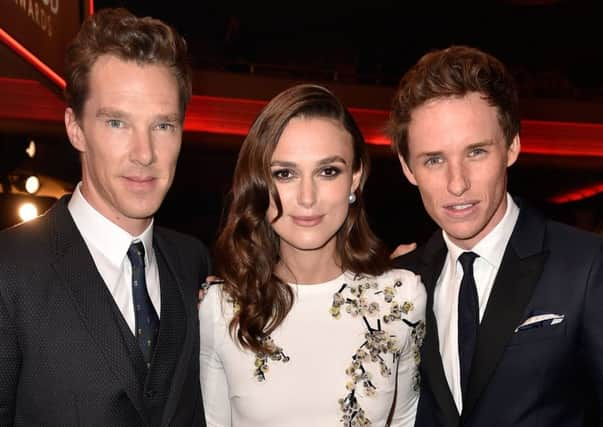Martyn McLaughlin: Upper class voices have taken over telling us stories


What will be the future of artistic expression in this country if the institutions tasked with promoting it preside over a culture of exclusivity and inaccessibility?
It is a question that has been raised this week by Maureen Beattie, the newly installed president of Equity, who warned that youngsters from working class households who aspire to careers on the stage and screen are being locked out of the profession due to the prohibitive cost of education.
Advertisement
Hide AdMaureen Beattie stressed that compared to her formative years in the profession, an era in which arts funding was plentiful, the budding young actors of today are being excluded on account of their low-incomes and backgrounds.
In an interview with The Guardian, Ms Beattie, who was elected unopposed to the union’s presidency last month, said: “We are increasingly finding that it is more and more difficult for people from working class backgrounds to get into the business.
“The mountain they have got to climb, to put themselves through, the bursaries are less and less and the grants have just disappeared. People are being cut off in the bud before they even have a bash at it.”
Ms Beattie, the daughter of Johnny, the veteran Scottish comedian, entertainer and actor, trained in the 1970s at the Royal Scottish Academy of Music and Drama, nowadays known as the Royal Conservatoire of Scotland.
Even though her father and mother, Kitty Lamont, a model and theatrical agent, were not short of a “bob or two” at the time, the 65-year-old said she had “practically all of my fees paid” for her.
How galling it must be for the young actors of today to hear such stories of state-sanctioned benevolence and artistic encouragement.
Advertisement
Hide AdMs Beattie, by her own admission, was not from a disadvantaged background, but plenty of her award-winning peers were.
They too were given the freedom and opportunity to be judged on talent alone, a level playing field that has been taken away from successive generations.
Advertisement
Hide AdThe ubiquity of old Etonians such as Eddie Redmayne and Tom Hiddleston is often lazily seized upon as a sign of the paucity of working class voices in the acting game, but a growing body of research offers far more convincing – and damning – evidence.
Recent research by the Sutton Trust found that as many as 42 per cent of British BAFTA winners attended a private school, while a 2016 study by the London School of Economics and the University of Edinburgh, based on the Office for National Statistics’ labour force survey, found 51 per cent of actors were from privileged backgrounds, with just 16 per cent identifying as working class.
With the costs of drama school so high nowadays, particularly in London, where the problem of exorbitant fees is compounded by absurd rent rates, simply trying to get a foot in the door when you hail from a certain socio-economic group can be ruinous pursuit from the get go.
For all that the theatre establishment supposedly cherishes diversity, it remains almost inconceivable that some of Britain’s leading drama schools continue to charge audition fees for prospective students.
There are more than a dozen prestigious establishments who profit in such a way, including famous names like the Guidhall School of Music and Drama, the Royal Academy of Dramatic Art, and notably, Ms Beattie’s alma mater.
On its website, the esteemed institution promises that its three-year BA acting programme – a course whose previous students include stars such as James McAvoy and David Tennant – is “one of the best professional actor training programmes in the UK”.
Advertisement
Hide AdSuch privilege comes at a price, however. In addition to the travel and potential accommodation expenses of attending an audition in Glasgow, the candidates must also pay £55, whether they receive a call back or not. That is on top of a £25 “application fee”.
In fairness to the Royal Conservatoire, it has a fair access plan to promote equality and diversity, and since 2013, it has runs a programme called Transitions 20/40, designed to usher in students from areas of multiple deprivation into its undergraduate programme.
Advertisement
Hide AdThere has been improvement on this front – some 28 per cent of its undergraduate applicants last year hailed from the most deprived areas of Scotland, compared to 25 per cent in 2014/15 – but progress has been glacial, and such students continue to be under represented.
Welcome as such measures are, they seem to put the cart before the horse. Surely the Royal Conservatoire could take a stand, as Liverpool Theatre School has done, and abolish its audition fees altogether?
With tuition fees running into the thousands, such sums may seem trifling, but the problem with such initiatives is not their expense, but the message that they send out.
At the lowliest rung of a profession where the prospect of a living wage, let alone the promise of fame, is precarious, the ladder is being pulled up from those without the means to showcase their abilities.
In order to address to working class deficit in the acting profession, there are other, arguably bigger problems that must be addressed, not least the dwindling stream of National Lottery funding to Creative Scotland, but if change is to come, ensuring all young actors have the chance to be heard seems a reasonable and symbolic first step.
